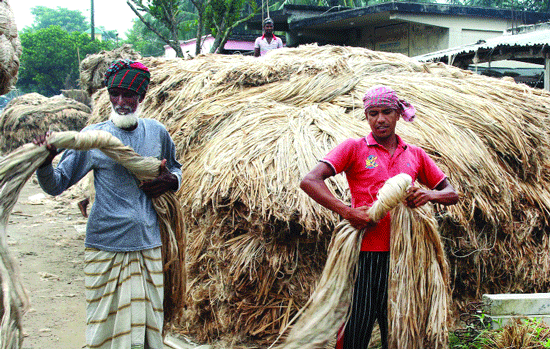Raw jute prices in free fall as exports decline
Industry Desk: Raw jute prices have plummeted in the southwest region of the country frustrating farmers and small traders who have sought government interventions immediately to find out the reasons and address the problem.
Raw jute was sold at over Tk3,000 per maund (one maund is about 37 kg) at the beginning of this year and now it is one-third or half that price.
On one hand, farmers are not getting the fair price while on the other, small traders, who have already bought a huge amount of jute from farmers, are counting losses. Many are forced to leave jute business altogether. Jute exports dropped during the pandemic for the failure to supply jute properly. Besides, an increase in the demand for raw jute in domestic jute mills has caused the exports to decline.
Small traders said the price offered by local mills was much lower than that by exporters.
Abdul Mannan Mollah, a farmer from Shalikha upazila of Magura, who cultivated jute on about three acres of land this year, is extremely disappointed.
“Suddenly, the price [of jute] has come down by Tk1,000-1,500 per maund. Had I known earlier, I would not have cultivated jute this time,” said a frustrated Abdul.
Another farmer Idris Ali from Hatbaria village in the same district has cultivated jute on about one acre of land.
“A week ago, jute was sold at Bunagati market for Tk3,800, which is now Tk2,500. Yet, traders are not interested in buying. If this situation continues, jute farmers will have to starve,” he said. The situation is the same in other markets such as Narikelbaria, Shimakhali, Nahata, Rajapur, Maizpara, Langolbadh, Faridpur, etc.
Traders said the price was likely to fall further.
According to the Bangladesh Jute Association (BJA), the country’s jute exports fell sharply between 2007-08 and 2020-21 (April). Due to falling exports, many have left the business while many have been sentenced to jail for not being able to repay their bank loans. Many are on the run as they are unable to repay their bank loans.
In the past, Bangladesh exported more than 28 lakh bales of jute, but only five lakh bales of raw jute were exported in the last financial year. Moreover, jute used to be exported to over 30 countries but at present, the number has come down to only 13 countries. Neighbouring India is still importing the highest amount of raw jute from Bangladesh.
In a letter sent to the secretary to the jute and textile ministry in May, the BJA stated that 46 traders had exported 5.02 lakh bales of jute to 13 countries – India, Pakistan, China, Nepal, Brazil, Belgium, Vietnam, Ivory Coast, El Salvador, Russia, Philippines, United Kingdom and Tunisia – from July 2020 to April this year. Of this, 1.88 lakh bales were exported to India and 1.46 lakh bales to Pakistan.
Jute exports from Bangladesh amounted to 28.70 lakh bales in the 2007-08 financial year. At that time, 60-70 exporters used to export raw jute to 30-35 countries.
SM Saiful Islam Piyas, the proprietor of Khulna-based Pinitah Trade Internal Company and CEO of Pragati Jute Supply, said raw jute exports could not make much profit in the fiscal year 2020-21. BJA President Sheikh Syed Ali said the condition of raw jute traders amid the pandemic was very bad. “No incentive has been given by the government. Traders are frustrated as the export of raw jute from the country is declining day by day.”
Rare Israeli airstrike in Beirut kills Hezbollah commander and more than a dozen others
International Desk: Israel launched a rare airstrike that killed a senior Hezbollah milita…








